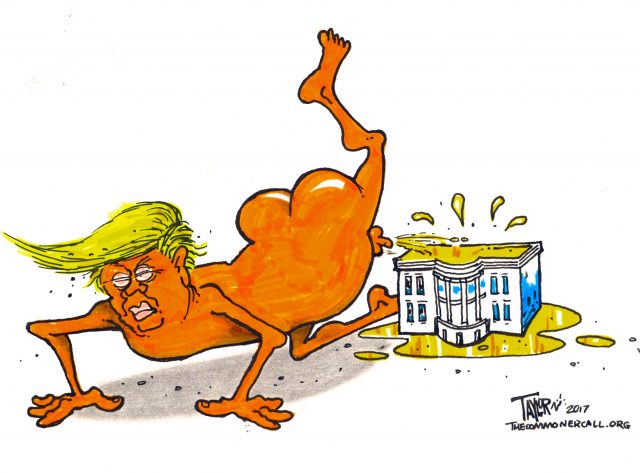
By Dan Peak
The Commoner Call (10/9/17)
Dear Fellow Readers,
The news dictates a look-back approach for today’s episode of the Russia Monitor…
Let’s use Rachel Maddow’s program as a starting point to consider how October 7, 2016 unfolded. This was a seminal moment in the 2016 election and the exposure of Russian interference for the benefit of Trump: At The Center Of 2016’s Most Intense Weekend.
One year ago we had a one-day news cycle that started with Hurricane Matthew skirting the coast of south Florida as the first Category 5 hurricane since Felix in 2007 then moving on to wreak havoc along the coast of Florida, Georgia, the Carolinas and Virginia.
Next up was the announcement by former Secretary of Homeland Security Jeh Johnson and former Director of National Intelligence James Clapper that Russia was interfering in our election. The story was the top story of the day – for about an hour. As James Clapper relates to Maddow, the questions over time were, “Why didn’t you say something?” Clapper points out, “we did”.
No one heard them.
On the heels of the Johnson-Clapper announcement The Washington Post released the scandalous Access Hollywood Tape with Trump sharing with Billy Bush his relationship philosophy and his history of groping women. This was two days before the second Clinton-Trump debate and all assumed we knew the theme of the remainder of the campaign.
But not for long!
Hillary Clinton’s campaign chairman John Podesta’s email file had been hacked and was released by WikiLeaks only a half-hour after the release of the Access Hollywood Tape.
The timing of the release of Podesta’s emails by WikiLeaks was not a coincidence and the main story of the day had shifted to the tawdry details of Access Hollywood, most notably burying the Johnson-Clapper announcement of Russian interference in the campaign to tilt the election in favor of Trump. Russia, with an assist from WikiLeaks in this instance, took the day.
Here’s a special program that takes us through that day: 64 Hours In October: How One Weekend Blew Up The Rules Of American Politics.
One year later and we are still struggling to understand the extent of Russian involvement in our election and collusion with the Trump campaign.
It is now nine months ago that we learned of the existence of the Christopher Steele Dossier and as The Guardian detailed Saturday, The Trump-Russia Dossier: Why Its Findings Grow More Significant By The Day.
“Nine months after its first appearance, the set of intelligence reports known as the Steele dossier, one of the most explosive documents in modern political history, is still hanging over Washington, casting a shadow over the Trump administration that has only grown darker as time has gone by.
“It was reported this week that the document’s author, former British intelligence official, Christopher Steele, has been interviewed by investigators working for the special counsel on Russian interference in the 2016 election.”
It is noteworthy that, so far, the Steele Dossier has stood the test of time, despite the great effort to discredit the author and the dismiss the findings. Even Senate Intelligence Committee Chair Sen. Richard Burr (R-NC), a Trump supporter, has begrudgingly acknowledged the question of collusion is an “open question”.
Burr’s comment followed an earlier announcement in the week by Burr and Sen. Mark Warner (D-VA) that the Intelligence Committee had concluded Russia indeed interfered in the election to benefit Trump – just as Jeh Johnson and James Clapper had announced one year ago.
The Senate Intelligence Committee has said it has confidence in a U.S. agency finding earlier this year that Russia intervened in the US presidential election in an effort to skew the vote in Donald Trump’s favor: Top Senate Intelligence Duo: Russia Did Interfere In 2016 Election. Burr went on to warn that Russian intelligence could threaten the next round of congressional elections next year.
The Guardian says of the Steele Dossier:
“But as every passing month brings more leaks, revelations in the press, and more progress in the investigations, the Steele dossier has generally gained in credibility, rather than lost it.”
The article offers a number of instances where parts of the Steele Dossier have been validated. Here’s an example with the Donald Trump Jr. Trump Tower meeting with Russians in June 2016:
“Just 11 days after that meeting – but more than a year before it became public – Steele quoted a source as saying that “the Kremlin had been feeding Trump and his team valuable intelligence on his opponents, including Democratic presidential candidate Hillary Clinton”, for several years.”
Tying these two look-backs together, Steele acknowledges the Russian hacking of Podesta’s emails and the distribution on the internet through WikiLeaks:
“A Steele memo from August 2016 states that after Russia’s hand had been discovered in the hacking of Democratic party emails and passing them to WikiLeaks for publication, another avenue of influence would be explored.
“The memo says “the tactics would be to spread rumours and misinformation about the content of what already had been leaked and make up new content”.
As we now know, Russia made extensive use of social media – notably Facebook and Twitter – to spread rumor and misinformation to Trump’s benefit.
The dossier is garnering increased attention and credibility, not less.
In fact, as reported by CNN, Special Counsel Robert Mueller’s Team Met With Russia Dossier Author.
Trump has repeatedly assured the nation there was no Trumpland communication or contact with Russia. We’re laughably miles past that bald-faced lie. Similarly, he’s attacked the Steele dossier:
“Ever since the dossier came to light in January, Trump and his allies have repeatedly insisted that it is a complete work of fiction. He told The New York Times this summer that the dossier “was totally made-up stuff.” In a series of tweets earlier this year, Trump said the memos were written by a “failed spy” who had relied on “totally made-up facts by sleazebag political operatives.”
We are well past these Trump lies as well.
Senate Judiciary Committee Chair Sen. Chuck Grassley (R-IA) has lead us to believe we’d see the testimony of Glenn Simpson, founder of Fusion GPS, the person/company that initially hired Christopher Steele, a former British intelligence agent, to do opposition research on Trump for a group of republicans during the 2016 primaries.
Newsweek looked at the issue in late August: Who is Glenn Simpson? Trump ‘Pee Tape’ Dossier Firm Founder Could Testify in Public About Russia Claims.
Simpson was interviewed in a closed session for eight hours and encouraged Sen. Grassley to release the testimony. So far – nothing.
One Year Later
It now looks as if the only person close to the Trump-Russia investigation that holds to the notion that it’s all fake news is Donald Trump. Even key members of his administration agree. It’s hard to ignore given how many people around Trump have admitted to as much – Sessions, Flynn, Manafort, Donnie Jr., and on and on. But, as is his habit, Trump holds fast to his own Trumpland conclusions regardless of the facts. Many times this hurts us – but in this instance I have faith it will hurt him.

The Pee-Pee Type
(Commoner Call cartoon by Mark L. Taylor, 2017. Open source and free to use with link to www.thecommonercall.org )

